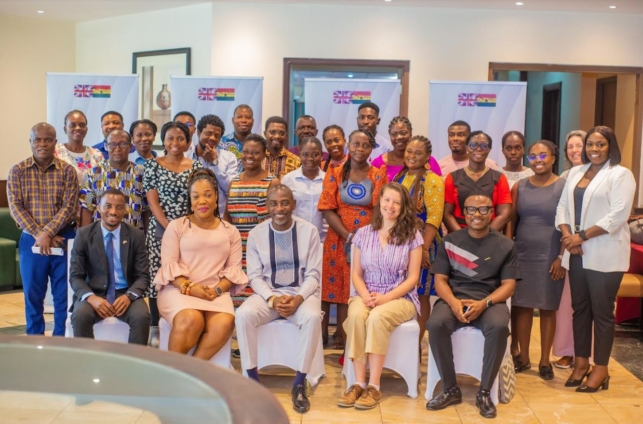Twenty journalists from across Ghana have completed the UK-Ghana Science, Technology, and Innovation (ST&I) Strategy’s Capacity Building for Excellence in Science, Technology, and Innovation Reportage programme.
The participants underwent a comprehensive itinerary covering modules on the National System of Innovation, the power of Generative Artificial Intelligence, Frontier Tech ideation, and the art of science storytelling. They delved into enhancing STI reportage through workshops on science communication, intellectual property, technology transfer, and fostering university-industry partnerships.
UK-Ghana Science, Technology, and Innovation (ST&I) Strategy intends to increase the number, quality, and impact of UK-Ghana ST&I partnerships through its four foundational pillars: Ecosystem coordination; Knowledge and skill sharing; Partnership co-creation; Commercialization & scaling up.
The strategy hinges on recognizing that without sufficient knowledge and collaboration among stakeholders, potential opportunities may be overlooked, and the impacts limited.
Aligning initiatives, fostering the formation and utilization of new partnerships while addressing the barriers that hinder progress in ST&I initiates possibilities and improvement.
Richard Sandall, the Development Director at the British High Commission, opened the event by emphasizing the importance of excellence in reporting on science, technology, and innovation.
“The UK is a Science, Technology, and Innovation superpower. Science and technology underpin our ambitions both at home and abroad.
“There is often a big barrier between what scientists know and getting that information to the people who can use it – decision makers, businesses, activists, or teachers.
“That barrier is like a vacuum where information should be. And where there is a knowledge vacuum, misinformation rushes in.
“…society needs you. That is why perhaps, you become journalists” he said to the first cohort of journalists enrolled in the training programme.
Sandall further explained that “a journalist’s responsibility extends beyond merely documenting scientific and technological advancements; it encompasses the interpretation and communication of their relevance and effects to a general audience. This involves not only presenting facts but also contextualizing them in a way that highlights their broader implications.”
Chair of the Media Capacity Enhancement Programmed (MCEP) Prof. Kwamena-Aidoo, addressed the notable issue of scarcity of specialized journalists capable of effectively covering complex ST&I topics, leading to an increase in content generated by public relations rather than independent journalism.
“The rare collaboration between the British High Commission, the Ministry of Environment, Science, Technology, and Innovation (MESTI) and the Ministry of Information (MOI) for this event, underscores the recognition of pressing challenges within science, technology and innovation reporting, and the need for concerted efforts and comprehensive training to address such,” he started.
He continued, “The challenges we face in science, technology, and innovation reporting are multifaceted and demand strategic interventions."
Prof. Kwamena Kwansah-Aidoo acknowledged that for most journalists, they struggle to simplify scientific information and accurately present it for public consumption stemming from the use of technical language by scientists and the fast-paced news environment.
“Journalists encounter significant hurdles in translating complex scientific information into engaging, accessible stories for the public.
“Technical jargon, statistics, and research findings often pose formidable obstacles, exacerbated by the relentless pace of the news cycle with its stringent deadlines, which impede thorough research and fact-checking processes,” he said.
Nonetheless, he reminded journalists of the power they wield in shaping narratives and driving change.
“As journalists and communicators, we are not mere observers of history; we are its chroniclers and architects as well. With our pens, cameras, and voices, we possess the power to shape narratives, challenge conventions, and inspire action.”
Following five days of intense, immersive and practical training in Science, Technology and Innovation reportage, we look forward to see these journalists reconstruct Ghana’s narrative on ST&I through their compelling stories.
Latest Stories
-
Paris 2024: Opening ceremony showcases grandiose celebration of French culture and diversity
2 hours -
How decline of Indian vultures led to 500,000 human deaths
3 hours -
Paris 2024: Ghana rocks ‘fabulous fugu’ at olympics opening ceremony
3 hours -
Trust Hospital faces financial strain with rising debt levels – Auditor-General’s report
4 hours -
Electrochem lease: Allocate portions of land to Songor people – Resident demand
4 hours -
82 widows receive financial aid from Chayil Foundation
4 hours -
The silent struggles: Female journalists grapple with Ghana’s high cost of living
4 hours -
BoG yet to make any payment to Service Ghana Auto Group
4 hours -
‘Crushed Young’: The Multimedia Group, JL Properties surprise accident victim’s family with fully-furnished apartment
5 hours -
Asante Kotoko needs structure that would outlive any administration – Opoku Nti
5 hours -
JoyNews exposé on Customs officials demanding bribes airs on July 29
6 hours -
JoyNews Impact Maker Awardee ships first consignment of honey from Kwahu Afram Plains
7 hours -
Joint committee under fire over report on salt mining lease granted Electrochem
7 hours -
Life Lounge with Edem Knight-Tay: Don’t be beaten the third time
7 hours -
Pro-NPP group launched to help ‘Break the 8’
8 hours

